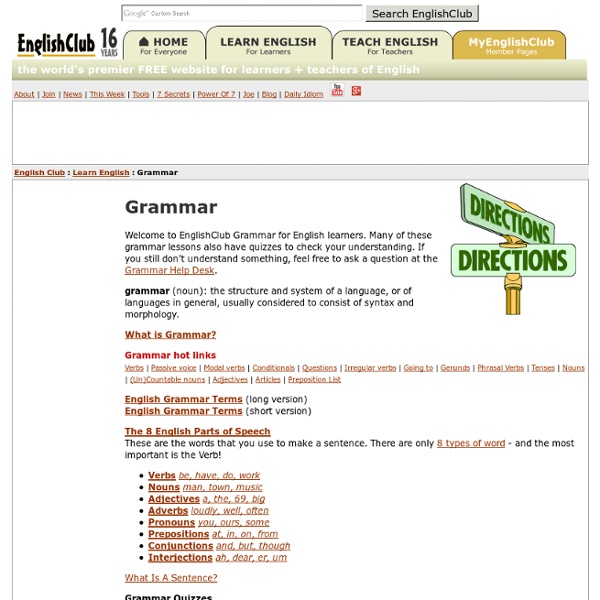BBC Learning English | Grammar Challenge
Daily Grammar - Improve your writing with our free grammar lessons
ESL Teacher Handouts, Grammar Worksheets and Printables
Free English grammar and vocabulary worksheets and printable handouts, for English language and English as a Second Language (ESL) teachers and instructors to use in the classroom or other teaching environment. Get our ESL handouts newsfeed: Beginner English Handouts Adjectives and Adverbs Articles Comparatives & Superlatives Conjunctions Determiners A, An, Some or One (8) General Modals Must & Can (10) Nouns Parts of Speech Prepositions Present Simple Pronouns Pronunciation Pronunciation of 'th' (10) Questions Relative Pronouns Relative pronouns- Which & Where (10) Since and For Some & Any Spelling and Punctuation Syllables How many syllables? Verbs and Tenses Vocabulary Intermediate English Handouts Conditionals Direct & Indirect Speech Indirect speech (15) Future Forms Gap Filling Gerunds and Infinitives Idioms Singular & Plural- Noun + Noun (10) Passive Past Simple Phrasal Verbs Prefixes & Suffixes Suffixes: -dom, -hood, & -ship (10) Present Perfect Question Tags Indirect Questions (10) Which syllable is stressed? Collocation
Grammar Girl
Mignon Fogarty is the creator of Grammar Girl and the founder and managing director of Quick and Dirty Tips. A magazine writer, technical writer, and entrepreneur, she has served as a senior editor and producer at a number of health and science web sites. She has a B.A. in English from the University of Washington in Seattle and an M.S. in biology from Stanford University. Mignon believes that learning is fun, and the vast rules of grammar are wonderful fodder for lifelong study. Grammar Girl provides short, friendly tips to improve your writing. To book a lecture event with Mignon Fogarty for your company or organization, contact Macmillan Speakers. Follow Mignon on Google+, Twitter, Facebook, StumbleUpon, LinkedIn, and Pinterest. Awards Media The Oprah Winfrey Show, Grammar Girl Fixes Common Mistakes, March 2007 "Mignon has come up with clever ideas to help even the most grammatically challenged person remember the rules." New York Times, Book Not Ready for Print? Los Angeles Times
Sign In
2012 SJR (SCImago Journal Rank) Score: 0.668 | Ranking: 117/619 Education (Scopus®) This item requires a subscription to Journal of Research in International Education. To view this item, select one of the options below:
Common Errors in English Usage
Use the search form below to find words and phrases on this site. About this Search Engine E e.g. / i.e. each early adapter earmarks / hallmark earth, moon easedrop ecology / environment economic / economical ecstatic ect. -ed / -t edge on eek / eke efforting ei / ie either / or, neither / nor either are / either is eighteen hundreds / nineteenth century electrocute elegy / eulogy elicit / illicit ellipses email embaress emergent / emergency emigrate / immigrate eminent / imminent / immanent empathy / sympathy emphasize on emulate / imitate end result enamored by endemic / epidemic engine / motor English / British enjoy to enormity / enormousness enquire / inquire ensuite ensure / insure enthuse entomology / etymology envelop / envelope envious / jealous enviroment epic / epoch epicenter epigram / epigraph / epitaph / epithet epitomy eponymous equally as equivocate / equal -er / -est error / err -es espouse / expound / expand et al.
Learn English Grammar Step by Step:Learn English Grammar
Grammar is the set of rules that govern the usage of English language. A strong grasp of English grammar is therefore of the greatest importance. Most non-native English speakers make grammatical mistakes while speaking in English. Improving grammar takes time and effort but it is well worth it. Here are some tips which will help you improve English grammar Understand the building blocks of grammar As a first step, it is important to know the different building blocks of grammar like nouns, pronouns, articles, adjectives, verbs, adverbs, prepositions, conjunctions and interjections. Pay attention to sentence structures When you read an article or watch a movie, it is important to pay attention to how sentences are constructed. Practice when you can This tip can never be overemphasized. Grammar exercises will help you Try doing different grammar exercises and find out your weaknesses. Find a mentor Many learners have improved their grammar working with a mentor. Join a course Grammar Lessons
Grammar, a Victim in the Office - WSJ
About Thinking Writing | Thinking Writing
The way in which the TW team help to foster creativity and innovation in a no-nonsense and supportive way is invaluable Thinking Writing is part of Learning Development in Student Services at Queen Mary, University of London. We work with academic colleagues and students around thinking and writing: thinking, writing, and thinking about writing. We help with: designing modules and assessments developing tasks and materials teaching - on a collaborative basis running writing or reading retreats practical advice on helping students with writing evaluating the above - what works, what doesn't, how do students react? We recognise that developing educational practice takes time and we try to facilitate the process in a number of ways - through conversation, linking with relevant research, providing sample resources, bringing in an outside expert. This website introduces you to some of the ideas we work with and examples of how these ideas are developed in practice.




La gramàtica que vaig estudiar en el nivell 1 d'anglès by patripm Apr 16